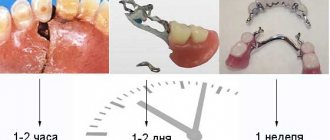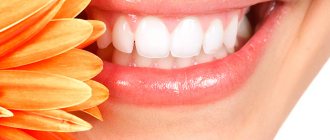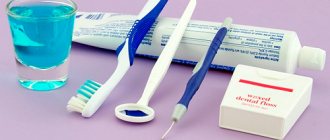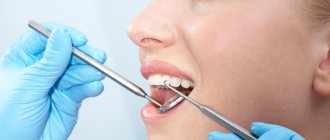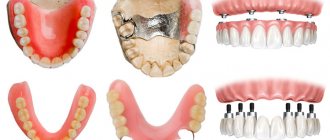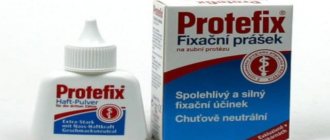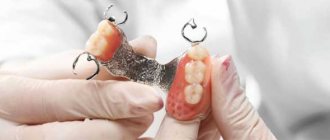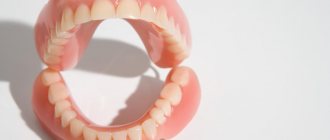If for some reason a person has lost his teeth, then after contacting a dental clinic he will be offered to eliminate the problem using removable structures. Today, such products are very comfortable to wear, and others will not even notice that they are not real. But you can only maintain their appearance if you know how to clean dentures at home. With regular care and cleaning, removable teeth will last a long time.
How long does it take to get used to removable dentures?
On average, 30 days. At the beginning of use, removable dentures feel like a foreign body and can cause discomfort. They can interfere with the production of sounds (diction), cause increased salivation, changes in taste and temperature sensations, and difficulty biting and chewing food. Sometimes, when applying removable dentures, the urge to vomit may occur. It is also possible that the dentures do not adhere satisfactorily, or food debris gets underneath them, or biting the cheeks, lips, or tongue. All these phenomena decrease by the end of the first week of wearing the prosthesis and disappear after 3-4 weeks. After an adaptation period, the patient already feels more comfortable with prostheses than without them.
The main condition for quickly getting used to prostheses is their constant use. The rules and recommendations below will help you shorten the adaptation period.
Nylon dentures
To preserve the properties of nylon structures for a long time, we must not forget about special care, otherwise the loss of their aesthetics and functionality and an unpleasant odor are guaranteed.
Caring for nylon dentures involves home and professional cleaning. When cleaning the house, nylon can be scratched if you use hard brushes. Therefore, it is recommended to acquire only soft models of brushes and pastes that do not contain abrasive substances. To protect against damage, they should be put on or taken off over a sink filled with water. You can fold a terry towel in several layers and carry out these manipulations over it.
Due to the fact that this material is capable of absorbing foreign odors and being stained by drinks and food, wearers of such prostheses need to disinfect them more often. For these purposes, dental nylon liquid, cleansing tablets such as Corega or ROCS are used.
To remove bacterial plaque from them that cannot be cleaned at home, an ultrasonic bath is used. The procedure is performed by a doctor in the clinic, where he also examines the gums under the structure. Thanks to the use of ultrasound, the surface gets rid of not only bacteria, but also coloring substances (nicotine) and tartar.
How to quickly get used to new dentures
- Immediately after submitting the finished work in the dentist’s chair, learn how to remove and put on removable dentures yourself. At home, practice again, first in front of a mirror, then without it.
- Before applying, soak removable dentures in water or use a fixative.
- For the first one and a half to two weeks after the application of dentures, they should not be removed from the mouth, even at night. Take them out only for cleaning and oral hygiene.
- To reduce the gag reflex, try sucking the candy by placing it towards the roof of your mouth and holding it in this position with your tongue.
- Rinse your mouth often with warm water (8-10 times a day) or drink hot tea.
- Reading aloud in a calm, relaxed atmosphere for 2 hours helps to quickly restore correct pronunciation. In most patients, diction is restored quite quickly (after 5-6 days)
- For the first 2-4 days of wearing the prosthesis, try to eat soft foods and not load the prosthesis until you fully adapt to it. Try not to bite with your front teeth. Chew your food slowly and thoroughly.
- Chew food with your side teeth at the same time (left and right at once). Cut food into small pieces. Introduce more fruits and vegetables into your diet (this will allow you to switch to your usual diet earlier).
Rules of care
There are basic rules for caring for plastic dental structures:
- After each meal, rinse the denture under running water. Do this carefully so that no food particles remain. In this case, you need to be extremely careful, since if the product falls and hits a hard surface of the sink, it can be damaged.
- In the morning and before bed, brush your dentures in the same way as your natural teeth. If you have your own teeth, remove the structure and clean it with a brush and toothpaste. After this, brush your teeth, gums and tongue. To do this, use a soft brush.
- Clean the denture thoroughly once a week. Use any solution purchased at the pharmacy. Most often they are sold in the form of effervescent tablets that dissolve in water. Place the structure in the resulting solution and keep it there for the specified time.
- To clean the denture, use a brush with stiff bristles. Before doing this, soak the product in warm water.
- Once every 6 months, take the denture to the dentist for cleaning.
- Do not soak the denture in too hot water
If the structure is removed for more than 2-3 hours, then it should be stored in water. Otherwise, the product will begin to crack and deform.
Caring for plastic dentures is a set of measures that will not only allow them to always be white and well-groomed, but will also prevent them from breaking and deforming. There are a large number of bleaching methods, so the choice of the optimal one will depend on two factors - personal wishes and the degree of contamination of the structure.
What are the main rules when using removable dentures?
Dentures must be clean. After each meal, they should be removed from the mouth and washed thoroughly with soap and water.
Removable dentures should be protected from mechanical and chemical damage, as well as from exposure to high temperatures. If cracks or breakages appear in a removable denture, you cannot use it; you must consult a doctor for repairs.
Do not take breaks from wearing a prosthesis for more than one and a half to two weeks, because... this can lead to an initial discomfort that can make it difficult to fit the prosthesis exactly into place. As a rule, if a prosthesis is not used for more than a month, it becomes unusable and a new one needs to be made.
What else you need to know when choosing a denture without a palate
A prosthesis without a palate is always fixed to an abutment tooth or a crown on an implant. When installing on your own teeth, minor grinding may be required. After dentures, you must carefully observe the rules of home hygiene and regularly come to the clinic for professional cleaning. In hard-to-reach places and under the elements of the prosthesis, plaque can accumulate and pathogenic microorganisms can multiply.
In our clinic you can install a prosthesis without a palate, which is optimal for your clinical case. Our doctors will help you restore a beautiful and healthy smile.
What is prosthesis correction and when should it be done?
After applying removable dentures in the oral cavity, as a rule, pain appears in some areas underneath. This is due to the inevitable gradual subsidence (pressure) of the removable denture on the mucous membrane. This factor cannot be fully taken into account when designing these orthopedic structures, therefore, correction is necessary to eliminate unpleasant sensations. It consists of “undermining” the dentures in those areas where it presses on the oral mucosa.
The first correction must be carried out the next day after the start of using dentures. The next 3-4 corrections must be carried out over a period of one and a half to two weeks as necessary. You may need more visits to the dentist after completing your work (up to 10).
In case of severe pain, you need to remove your dentures and put them in a special container or glass of water. Before going to the doctor for correction, you must wear dentures and walk around with them for at least 3-4 hours. This will allow the doctor to see a clear imprint on the mucous membrane and correct only the place that is rubbing the gum. Bringing a denture in your pocket and pointing your finger in your mouth is useless. In removable dentures, every centimeter, and sometimes even a millimeter, of the supporting surface is of great importance. If the correction is inaccurate, the fixation of the prosthesis may be impaired. This is exactly what happens if you try to grind or file dentures yourself. After correction (adjustment) of removable dentures, you must not use them for 1 day. During this period (during the healing period of the namin), it is advisable to rinse your mouth and make baths (hold the solution in the mouth at the site of the namin) with herbal decoctions. Use a decoction of chamomile flowers, oak bark, etc. For example, take 0.5 tablespoons of dry oak bark, brew in one glass of boiling water, cool, apply the decoction 3-5 times a day. You can also use medicines, for example Kamistad gel, sold in pharmacies.
Feel free to visit your dentist for adjustments. Removable dentures, even if they are made in the most careful manner, require correction. Even if you do not experience any pain or discomfort, you should visit the dentist for an oral examination.
WARNING : Do not attempt to straighten dentures yourself with a file or any other tool. This can lead to breakage of the prosthesis and disruption of its fixation. Moreover, after such “repairs” it is no longer possible to do anything with the prostheses in the clinic. As a result, all that remains is the manufacture of new orthopedic structures.
Types of dentures without palate
- Clasp with a metal arc. Clasps are conditionally removable dentures. They consist of a metal base, a base that imitates gums, and artificial teeth. The clasps are fixed using clasps and attachments. They are distinguished by high strength and reliability. They can be used not only for prosthetics, but also for splinting mobile teeth. Clasp clasps are characterized by low aesthetics, since the fasteners are visible on the surface of the teeth. Service life is about 10 years.
- Quadroti (Quattro Ti). The design includes artificial gum, on which the teeth are attached, and bridges made of polymers. There are no metal elements, so the prosthesis is very light. Fixation with clasps, but due to the fact that the hooks are transparent, they are not visible on the teeth. Disadvantage: short service life. Quadrotti will last 5-7 years.
- Sandwich. Artificial teeth are fixed on the base, and rigid telescopic crowns are attached to the sides. A sandwich type prosthesis is fixed on the supporting teeth, so they are only suitable for the treatment of partial edentia, since there must be 1 healthy tooth on both sides. Not suitable for filling end defects. Service life – 5 years.
- Immediate prosthesis Butterfly. Lightweight design, which is used for temporary prosthetics. Fixed to the supporting teeth with hooks. Suitable for filling defects of no more than 3 units. Service life – 1 year.
Dentures without a palate differ not only in their design, but also in the method of fixation:
- On attachments. The arch is fixed using attachments (mini-locks).
- On clasps. A clasp is a metal hook fastener. With its help, the prosthesis is attached to your own teeth or artificial crowns on implants.
- On telescopic crowns. The most aesthetic way of fixation.
Dentures without a palate require the presence of natural teeth in the oral cavity to which they are attached. However, they can be used to treat complete edentulism. The role of your own teeth is performed by crowns on implants. The optimal protocol for implantation and prosthetics in such cases can be considered All-on-4 and All-on-6.
How to care for removable dentures
Proper care of them is of great importance for the period of adaptation (adaptation) and the service life of prostheses. Removable dentures require regular cleaning. The best option is to clean dentures daily after each meal under running water. The obligatory minimum is cleaning the prosthesis before going to bed. The main criterion is that the prosthesis must be as clean as on the first day. The cleaner the denture, the more comfortable you will feel it in your mouth.
When cleaning a denture with whitening toothpaste, scratches may form on it, which contributes to the rapid accumulation of plaque on the denture, because Such pastes contain abrasive substances, so for daily care you can use a weak soap solution.
Dirty removable dentures cause rapid wear and tear and inflammation in the oral cavity. If there is inflammation of the mucous membrane in places of contact with a removable denture, pain, or burning, you should immediately consult a doctor. From strong tea, coffee and smoking, removable dentures lose their appearance, turn yellow, and a brown coating appears on them. With good care, removable dentures retain their color and shine for a long time.
An indicator of good care is the absence of food and plaque on the prosthesis. To remove age spots from coffee and nicotine, etc., which may appear over time, you should consult a doctor. The dental technician will restore the necessary polish and shine.
To clean dentures, you can use special cleaning agents sold in pharmacies (President, Corega, Protefix). They also help get rid of plaque and destroy bacteria that cause bad breath. The prosthesis is placed in a glass of clean water and a tablet is lowered; the prosthesis is kept in the solution for a certain time recommended by the manufacturer.
Reviews about cleaning methods
After wearing dentures for a short time, a slight plaque began to form. It was difficult to solve the problem with toothpaste and a brush. Friends recommended tablets from which cleaning solutions are made. After several procedures, the coating became snow-white.
Natalya, Lipetsk
Buying false teeth every time they darken is very expensive. Regular paste didn't help. The forum recommended using folk remedies to clean dentures, so I chose the most popular one: vinegar with warm water. The problem was resolved quite quickly.
Alexey, Volgograd
I have been wearing artificial teeth for a long time, naturally, they darkened more and more every day.
No remedies helped. I went to the dentist and they offered me a service to whiten my dentures with ultrasound. The process did not last long. The doctor restored the original snow-white appearance of the coating and prescribed special solutions. Ekaterina, Moscow
How to improve the fixation of removable dentures
The anatomical conditions in the oral cavity do not always allow for the creation of good fixation for removable dentures. This especially applies to prosthetics for the complete absence of teeth in the lower jaw. Under unfavorable conditions, special fixing agents in the form of creams, fixing pads, and powders are used to keep it in the mouth. They are sold under the brands “President”, “Corega”, “Protefix” in any pharmacy.
The fixing cream is applied in a thin broken line to the prosthesis. Before applying the cream, removable dentures must be dried, for example with a cotton swab. Fixing powder is used for low salivation. It is applied in a thin layer to the wet denture, after which the removable dentures can be put on. Your dentist will help you decide on the choice of fixative.
Causes of darkening
Plastic is a porous material that, even after polishing, does not lose this property and still remains rough . Over time, coloring substances leave their mark on the surface of the product, and a plaque will form. Even with intensive cleaning, stains cannot be avoided.
This moment is especially unpleasant for those people who have their own teeth. Plastic structures will be much darker.
If you start caring for your prosthesis as early as possible, there is a chance to keep it in its original form for a long time. But such structures will not remain snow-white for many years.
What to do if your prosthesis breaks?
During the use of removable dentures, a fracture of the prosthesis or its individual parts (tooth, clasp) may occur. In this case, you need to consult a dentist. If a tooth(s) on which partial removable dentures are held or supported are lost, it is possible to weld an artificial tooth to the denture in place of the lost one. Repairing a removable denture takes 2-3 days. Repairs are made without warranty.
In case of cracks, fractures, etc. Do not try to fix the denture yourself, even if urgently. Only specialists can repair the prosthesis.
Making new removable dentures takes about 1 week. The warranty period for plastic removable and clasp dentures is usually up to 1 year. During the warranty period, the prosthesis is repaired or altered free of charge. After the warranty period expires, the work is paid in full.
Ultrasound method
You can whiten metal-ceramic teeth at home using an effective ultrasonic device. This device is used by dentists to remove plaque in the office with ultrasonic baths.
During operation of the device, small bubbles appear, penetrating the space between the teeth and seeping into the pores. Therefore, ultrasound destroys all microorganisms in difficult areas.
In what cases is it necessary to contact a dentist?
If you notice a burning sensation in the mucous membrane, severe dry mouth, skin rash and other unusual symptoms, you should contact your dentist, who, if necessary, will refer you to an allergist for allergy tests.
Once a year it is necessary to reline the removable denture. The fact is that while wearing a prosthesis, atrophy of the mucous membrane and bone tissue occurs under it. Because of this, a void appears between the prosthesis and the mucous membrane and the prosthesis does not fit tightly to the prosthetic bed. To eliminate these negative aspects, the prosthesis is relined - plastic is placed in place of the void formed due to atrophy and a tight fit of the prosthesis is restored. If relining a removable denture is done at the wrong time or not done at all, the removable denture becomes unusable.
Visit your dentist at least twice a year, consult with him about the specifics of caring for your oral cavity, and use special devices and medications recommended by him, if necessary!
Advantages
Dentures without a palate are comfortable, convenient, and have a short adaptation period. By design, they are classified as conditionally removable. They do not need to be removed at night or for cleaning. Fitting and correction are done in a dental clinic. Such designs have other advantages:
- Safety. When worn, there is no gag reflex, there is no risk of damaging soft tissues, and salivation does not increase. You can lead a normal life and not think about the fact that you have a denture in your mouth.
- Uniform load. Compared to removable dentures, conditionally removable dentures provide a more uniform load on the jaw. When wearing them, there are practically no restrictions on food. You can even eat solid food - there will be no overload.
- Affordable price. A removable denture will cost less, but in terms of aesthetics, comfort and safety it is inferior to palateless conditionally removable structures. Fixed ones are aesthetic, strong, durable, but expensive. Dentures without a palate have an optimal cost.
